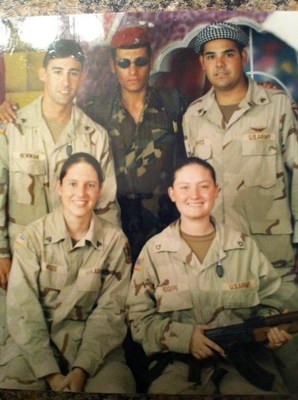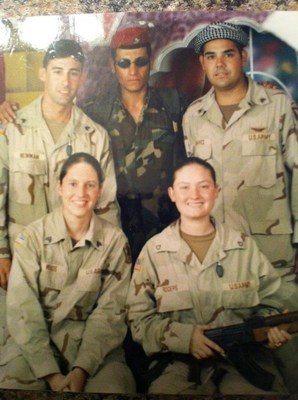Veteran Finds Connections and Reduces Isolation Through Wounded Warrior Project
BEDFORD, Texas, Nov. 16, 2016 /PRNewswire-USNewswire/ -- For U.S. Army veteran Demecia Rogers, the rough years began during her deployment to Iraq in 2003. They might very well have continued, had she not reached out to Wounded Warrior Project® (WWP) – a decision that laid the foundation for the support network she is part of today.

When the U.S. began its war with Iraq, Demecia went downrange to do her part as a communications specialist with the 63rd Chemical Company, 101st Airborne Division. Training taught her to be vigilant when on the lookout for the enemy. The adversary she would eventually face, however, was on her side of the battle line – a situation for which she was less than prepared.
"While I was deployed, I was sexually assaulted," she said.
Due to a back injury she sustained while deployed, Demecia was eventually given a medical discharge from the Army, and she said her official goodbyes to military service in May of 2005. What followed was a difficult period of isolation that lasted nearly three years. When she finally decided she was ready to emerge from her lonely struggles, she contacted WWP.
The first WWP program event Demecia ever took part in was a women's multi-day mental health rehabilitative workshop in Corpus Christi, Texas. Coming from a lengthy period of emotional solitude, the gathering was a refreshing change for her. Warriors participated in physical challenges in outdoor environments while connecting with each other and working toward improving their outlook and health.
"It was the first program event I had ever gone to for veterans, and I definitely wasn't used to being around just female veterans," she said. "It was really nice to be around other women who could share their stories. We sat around a bonfire and talked about our experiences."
Demecia credits the outing as the catalyst on her road to mental recovery.
"That was definitely a big event for me," she said. "After that, I said to myself 'OK, I guess I really do need to deal with things. I need to get back out there in the world.' It was my starting point for becoming involved with people again. Until then, I honestly thought I was alone."
In a WWP survey of the injured warriors it serves, more than half of survey respondents (51.7 percent) talked with fellow Operation Enduring Freedom, Operation Iraqi Freedom, or Operation New Dawn veterans to address their mental health issues.
"There was so much about the workshop that was helpful to me," Demecia said. "We did yoga in the morning, which set a very relaxed tone for the day and helped us release tension we had built up. Classes in the afternoon helped us set personal goals and gave us tools to help us be kinder toward ourselves."
Demecia said the tools provided in the classes – along with the validation that came from talking with women who had similar experiences – were invaluable assets for her journey toward resolving her problems.
"Learning more about how to deal with our issues definitely helps our mental health," she said. "We find we are not alone, and now we have a safety net to help us along the way."
As she learned the importance of warrior interaction in the individual healing process, Demecia determined she wanted to be someone who could be called upon for help. She was asked to draw from her experiences and become part of a mentor training program. Once the person who looked to others for help with her post-military problems, she is now a source of assistance, empathy, and inspiration for fellow warriors traveling down the same path.
"I didn't know if I'd be helpful at first," she admitted. "But then I thought about how I've been out since 2005. I've been through the Department of Veterans Affairs paperwork process. I've participated in a lot of WWP programs. Sometimes I don't realize how much I know until I am talking to someone else who has questions."
Peer support and mentorship plays a significant role in the recovery process as injured veterans rely upon each other's learned experiences when managing day-to-day challenges. All WWP programs and services have an aspect of this support structure, while the Peer Support program is solely dedicated to ensuring every injured veteran, family member, and caregiver encourages one another in recovery, thus embodying the WWP logo of one warrior carrying another off the battlefield.
Being a source of empathy and information has been helpful to Demecia, especially during the low periods she sometimes experiences.
"We all isolate ourselves from time to time, but sometimes I start isolating myself again and begin feeling like I'm not useful," she said. "But then I'll talk to somebody who needs help. Every time I start thinking that I don't contribute, I'm reminded that I really do. I've begun to actually be there for other warriors, which keeps me going down the right path."
Demecia said she is proud to be a component of the emotional healing process – something she feels is essential to healing each warrior as a whole.
"The root of most veterans' issues lies in mental health," she said. "If we cannot affect and heal the mind, it can be difficult to heal the body."
She reminds her fellow warriors that WWP can play an integral role on the path to recovery.
"WWP programs have been extremely helpful as I adapt to my new normal," Demecia said. "The programs push me mentally, and it's a powerful boost to see I can do something that I thought I couldn't. WWP really empowers warriors to strengthen their mental health."
About Wounded Warrior Project
We Connect, Serve, and Empower
The mission of Wounded Warrior Project® (WWP) is to honor and empower Wounded Warriors. WWP connects wounded warriors and their families to valuable resources and one another, serves them through a variety of free programs and services, and empowers them to live life on their own terms. WWP is a national, nonpartisan organization headquartered in Jacksonville, Florida. To get involved and learn more, visit woundedwarriorproject.org.
Photo - http://photos.prnewswire.com/prnh/20161116/440112
SOURCE Wounded Warrior Project
